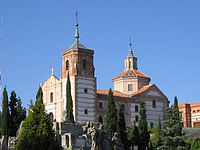
Getafe is a city of 181,000 people (2018) just south of Madrid. It is home to the Getafe Air Base, one of the oldest Spanish military air bases, and to the main campus of the Charles III University of Madrid. The Cerro de los Ángeles ("Hill of the Angels"), a site traditionally considered to be the geographical centre of the Iberian Peninsula, also lies within the municipal limits.
Understand
editClimate
editWinters are cool, with temperatures dropping below 10 °C (46.4 °F) during the day, and frequently below 2 °C (32 °F) at night. Getafe averages three to four snowfalls per year. Summers are very hot, with median temperatures above 25 °C (75.2 °F) in July and August, and with maximum temperatures which often reach 35 °C (95 °F). Daily temperatures oscillate within range of 10 °C (18 °F).
One of the major problems of Getafe's climate is air pollution, which increases noticeably when the wind blows south or southeast.
Get in
editBy train
editYou can take the Parla line from Madrid to Getafe.
By bus
editYou can travel from Plaza Elíptica bus station (on the grey Circular metro line) to the city centre of Getafe if you take the 441, 442, and 444 bus lines. Another, the 443, will carry you somewhat far away of it. There're also two night bus lines, that end in Plaza Elíptica: N803 and N805.
By car
editFour highways and divided highways pass through Getafe: two beltways (A-42 and A-4) and two highways leading through Madrid (M-45 and M-50). Another two-lane road connects Getafe with Leganés, and two provincial roads lead to Perales del Río.
By taxi
editTaxis from Madrid cost €15-20, and are the only option to get to Getafe after a late night out (01:30 or 02:00).
Get around
editIn Getafe there are 5 train stations and many bus stations which leave you in the city centre or around, wherever you want.
See
edit- Catedral de la Magdalena, a Renaissance era cathedral located in the center of the city with a baroque altar.
- Biblioteca Ricardo de La Vega, built in the 17th century as a prison and now being used as a public library. It's located next to the cathedral.
- Hospitalillo de San José, a former hospital built in the 16th century that has a small chapel and a central patio. A fine example of Castilian architecture.
- Colegio de Las Escuelas Pías, built in the 17th century and serving as a religious school even today.
- Iglesia de los Santos Justo y Pastor, in the Perales del Rio neighbourhood very far from the city (bus 411 from Legazpi, Madrid (yellow and grey Metro lines), and Getafe bus line L4). 18th-century building restored in 2004.
- Cerro de los Ángeles. A hill that is close to Getafe's industrial zone and in the other side of the N-IV highway, covered in good part by pine forests. Famous for being the geometrical centre of the Iberian Peninsula as well as the religious buildings that can be found at its top: the 17th century (rebuilt after the Spanish Civil war) Nuestra Señora de Los Ángeles hermitage and the Monument to the Sacred Heart, built in 1919.
Do
editLearn
editIf you are a student, in Getafe there is Carlos III university.
Buy
editIf you like shopping you should walk along Calle de Madrid.
Eat
editDrink
editYou can have a really fun night if you go to "Cabaret Madrid", a pub where you can drink and dance until 06:00.
Cafe Cibelina is where all the local football fans gather.
Sleep
edit- 1 Holiday Inn Express Madrid - Getafe, Av. Río Guadalquivir, 17, ☏ +34 916 24 04 50.
Connect
editAs of June 2022, Getafe has 4G from MasMovi/Yoigo and Vodafone, and 5G from Movistar and Orange.
Go next
edit- Onward routes by public transport mean heading into central Madrid.
- Aranjuez has a blingy royal palace.
- Toledo the ancient capital lies further south.
| Routes through Getafe |
| Central Madrid ← Southern Suburbs of Madrid ← | N |
→ Aranjuez → Córdoba |

